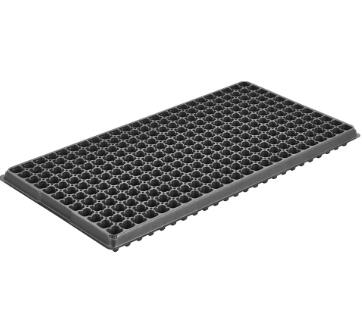What are the concerns of farmers about plastic seedling trays?
Farmers have expressed several concerns regarding the use of plastic seedling trays in their agricultural practices. Here are some common concerns associated with plastic seedling trays:
Environmental Impact: Farmers are increasingly concerned about the environmental impact of plastic seedling trays. Plastic is non-biodegradable and can persist in the environment for hundreds of years, contributing to pollution and litter. Improper disposal of plastic trays can lead to soil and water contamination, posing risks to ecosystems and wildlife. Farmers who prioritize sustainable farming practices are particularly concerned about the long-term consequences of plastic waste.
Waste Management: Dealing with plastic waste generated by seedling trays poses challenges for farmers. As the trays reach the end of their useful life, they accumulate in large quantities. Disposing of or recycling these trays can be expensive and time-consuming. In regions with limited waste management infrastructure, finding suitable methods for proper disposal becomes even more problematic. Farmers often have to seek alternative solutions for managing plastic waste, which can be a burden on their resources.
Cost: The cost associated with purchasing plastic seedling trays can be a concern for farmers, especially for those operating on small scales or in economically challenging environments. Plastic trays can be relatively expensive compared to alternative materials. Additionally, the need for regular replacement due to wear and tear or degradation further increases the financial burden on farmers. Some farmers perceive the cost of plastic trays as an unnecessary expense and seek cost-effective alternatives.

Durability and Breakage: Plastic seedling trays, particularly those made from thinner or lower-quality plastics, may lack durability. Farmers have reported issues such as trays breaking or cracking easily, especially during handling and transportation. Fragile trays can lead to damage or loss of seedlings, negatively impacting crop establishment and productivity. The need for frequent tray replacements adds to the financial and logistical concerns of farmers.
Heat Retention and Root Development: Plastic trays have been observed to retain heat, potentially affecting seedling growth. Excessive heat accumulation in plastic trays can lead to overheating of the root zone, causing stress and hindering healthy root development. This can impact the overall vigor and quality of seedlings, leading to suboptimal transplanting outcomes. Farmers who operate in hot climates or in greenhouse environments are particularly concerned about this issue.
Soil Moisture Management: Effective moisture management is crucial for successful seedling development. Some farmers have reported challenges with plastic trays in terms of regulating soil moisture levels. The non-porous nature of plastic can hinder proper drainage and airflow, leading to waterlogging or inadequate moisture retention. This can adversely affect seedling health and increase the risk of diseases such as damping-off. Farmers strive for optimal soil moisture conditions to promote healthy root growth and minimize the need for excessive irrigation.
In response to these concerns, some farmers have begun exploring alternative options such as biodegradable or compostable seedling trays made from organic materials like coconut fiber, paper, or bioplastics. These alternatives aim to address the environmental impact and waste management issues associated with plastic trays, while also offering potential benefits in terms of cost, sustainability, and plant growth.

Comments